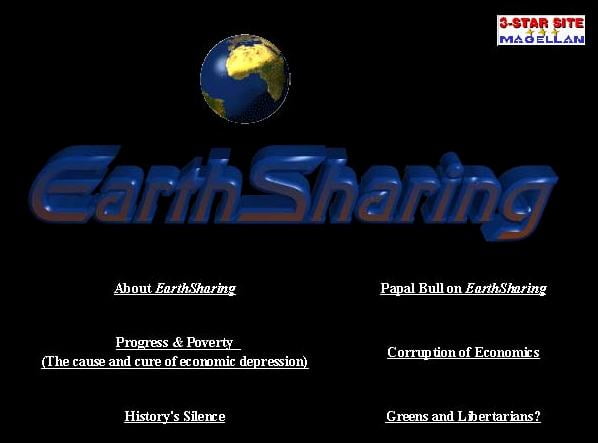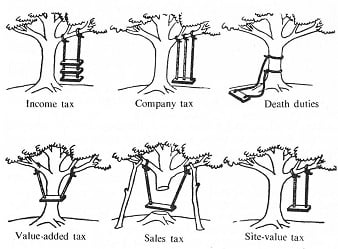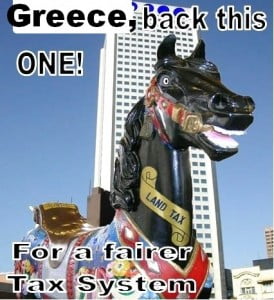 .
.
Posting Dr F.W.G. Foat’s early 20th century article yesterday reminded me of setting up the EarthSharing site in 1995 and doing all the HTML work myself. Foat’s strong piece on LAND was one of the first I posted on EarthSharing.
The website featured a revolving Earth accompanied the Star Trek “Voyager” theme.
OK, so it’s kitsch-looking and outdated – a bit like the appearance of this website – but isn’t it content that matters?
Let’s complete this little 100-year retrogression with some revealing thoughts on poverty and land price from Winston Churchill. His mum was a Henry George supporter, and he probably learnt Georgism on her knee.
~~~~~~~~~~~~~~~~~~~~~~~~~~~~~~~~~~~~~~~~~~~~~~~~~~~
LAND PRICE AS A CAUSE OF POVERTY
Winston Churchill’s Speech in the House of Commons, 4 May 1909,
in response to Mr AJ Balfour, Leader of the Opposition
The immemorial custom of nearly every modern State, the mature conclusions of many of the greatest thinkers, have placed the tenure, transfer, and obligations of land in a wholly different category from other classes of property. The mere obvious physical distinction between land, which is a vital necessity of every human being and which at the same time is strictly limited in extent, and other property is in itself sufficient to justify a clear differentiation in its treatment, and in the view taken by the State of the conditions which should govern the tenure of land from that which should regulate traffic in other forms of property.
Unearned Increment
When the Leader of the Opposition seeks by comparisons to show that the same reasoning which has been applied to land ought also in logic and by every argument of symmetry to be applied to the unearned increment derived from other processes which are at work in our modern civilisation, he only shows by each example he takes how different are the conditions which attach to the possession of land and speculation in the value of land from those which attach to other forms of business speculation.
“If,” he inquires, “you tax the unearned increment on land, why don’t you tax the unearned increment from a large block of stock? I buy a piece of land; the value rises. I buy stocks; their value rises.” But the operations are entirely dissimilar. In the first speculation the unearned increment derived from land arises from a wholly sterile process, from the mere withholding of a commodity which is needed by the community. In the second case, the investor in a block of shares does not withhold from the community what the community needs. The one operation is in restraint of trade and in conflict with the general interest, and the other is part of a natural and healthy process, by which the economic plant of the world is nourished and from year to year successfully and notably increased.
Landowner and Railway
Then the right hon. gentleman instanced the case of a new railway and a country district enriched by that railway. The railway, he explained, is built to open up a new district; and the farmers and landowners in that district are endowed with unearned increment in consequence of the building of the railway. But if after a while their business aptitude and industry create a large carrying trade, then the railway, he contends, gets its unearned increment in its turn.
But the right hon. gentleman cannot call the increment unearned which the railway acquires through the regular service of carrying goods, rendering a service on each occasion in proportion to the tonnage of goods it carries, making a profit by an active extension of the scale of its useful business – he cannot surely compare that process with the process of getting rich merely by sitting still? It is clear that the analogy is not true.
The Glasgow Example
I do not think the Leader of the Opposition could have chosen a more unfortunate example than Glasgow. He said that the demand of that great community for land was for not more than forty acres a year. Is that the only demand of the people of Glasgow for land? Does that really represent the complete economic and natural demand for the amount of land a population of that size requires to live on? I will admit that at present prices it may be all that they can afford to purchase in the course of a year. But there are one hundred and twenty thousand persons in Glasgow who are living in one-room tenements; and we are told that the utmost land those people can absorb economically and naturally is forty acres a year.
What is the explanation? Because the population is congested in the city the price of land is high upon the suburbs, and because the price of land is high upon the suburbs the population must remain congested within the city. That is the position which we are complacently assured is in accordance with the principles which have hitherto dominated civilised society.
The “Poor Widow” Bogey
But when we seek to rectify this system, to break down this unnatural and vicious circle, to interrupt this sequence of unsatisfactory reactions, what happens? We are not confronted with any great argument on behalf of the owner. Something else is put forward, and it is always put forward in these cases to shield the actual landowner or the actual capitalist from the logic of the argument or from the force of a Parliamentary movement.
Sometimes it is the widow. But that personality has been used to exhaustion. It would be sweating in the cruellest sense of the word, overtime of the grossest description, to bring the widow out again so soon. She must have a rest for a bit; so instead of the widow we have the market-gardener – the market-gardener liable to be disturbed on the outskirts of great cities, if the population of those cities expands, if the area which they require for their health and daily life should become larger than it is at present.
What is the position disclosed by the argument? On the one hand, we have one hundred and twenty thousand persons in Glasgow occupying one-room tenements; on the other, the land of Scotland. Between the two stands the market-gardener, and we are solemnly invited, for the sake of the market-gardener, to keep that great population congested within limits that are unnatural and restricted to an annual supply of land which can bear no relation whatever to their physical, social, and economic needs – and all for the sake of the market-gardener, who can perfectly well move farther out as the city spreads and who would not really be in the least injured.
The Mother of All Monopolies
From a Speech Delivered at King’s Theatre in Edinburgh on 17 July 1909
It is quite true that land monopoly is not the only monopoly which exists, but it is by far the greatest of monopolies – it is a perpetual monopoly, and it is the mother of all other forms of monopoly. It is quite true that unearned increments in land are not the only form of unearned or undeserved profit which individuals are able to secure; but it is the principal form of unearned increment which is derived from processes which are not merely not beneficial, but which are positively detrimental to the general public.
Land, which is a necessity of human existence, which is the original source of all wealth, which is strictly limited in extent, which is fixed in geographical position. Land, I say, differs from all other forms of property in these primary and fundamental conditions.
Nothing is more amusing than to watch the efforts of our monopolist opponents to prove that other forms of property and increment are exactly the same and are similar in all respects to the unearned increment in land.
Misleading and False Analogies
They talk to us of the increased profits of a doctor or a lawyer from the growth of population in the towns in which they live. They talk to us of the profits of a railway through a greater degree of wealth and activity in the districts through which it runs. They tell us of the profits which are derived from a rise in stocks and shares, and even of those which are sometimes derived from the sale of pictures and works of art, and they ask us – as if it were the only complaint: “Ought not all these other forms to be taxed, too?”
But see how misleading and false all these analogies are. The windfalls which people with artistic gifts are able from time to time to derive from the sale of a picture – from a Vandyke or a Holbein – may here and there be very considerable. But pictures do not get in anybody’s way. They do not lay a toll on anybody’s labour; they do not touch enterprise and production at any point; they do not affect any of those creative processes upon which the material well-being of millions depends.
Rewards for Service
If a rise in stocks and shares confers profits on the fortunate holders far beyond what they expected or indeed deserved, nevertheless that profit has not been reaped by withholding from the community the land which it needs, but, on the contrary, apart from mere gambling, it has been reaped by supplying industry with the capital without which it could not be carried on.
If the railway makes greater profits, it is usually because it carries more goods and more passengers. If a doctor or a lawyer enjoys a better practice, it is because the doctor attends more patients and more exacting patients, and because the lawyer pleads more suits in the courts and more important suits. At every stage the doctor or the lawyer is giving service in return for his fees, and if the service is too poor or the fees are too high other doctors and other lawyers can come freely into competition. There is constant service, there is constant competition; there is no monopoly, there is no injury to the public interest, there is no impediment to the general progress.
Fancy comparing these healthy processes with the enrichment which comes to the landlord who happens to own a plot of land on the outskirts or at the centre of one of our great cities, who watches the busy population around him making the city larger, richer, more convenient, more famous every day, and all the while sits still and does nothing.
Enrichment Without Service
Roads are made, streets are made, railway services are improved, electric light turns night into day, electric trams glide swiftly to and fro, water is brought from reservoirs a hundred miles off in the mountains – and all the while the landlord sits still. Every one of those improvements is effected by the labour and cost of other people. Many of the most important are effected at the cost of the municipality and of the ratepayers. To not one of those improvements does the land monopolist, as a land monopolist, contribute, and yet by every one of them the value of his land is sensibly enhanced. He renders no service to the community, he contributes nothing to the general welfare; he contributes nothing even to the process from which his own enrichment is derived.
If the land were occupied by shops or by dwellings, the municipality at least would secure the rates upon them in aid of the general fund, but the land may be unoccupied, undeveloped, it may be what is called “ripening” – ripening at the expense of the whole city, of the whole country for the unearned increment of its owner. Roads perhaps have to be diverted to avoid this forbidden area. The merchant going to his office, the artisan going to his work, have to make a detour or pay a tram fare to avoid it. The citizens are losing their chance of developing the land, the city is losing its rates, the State is losing its taxes which would have accrued if the natural development had taken place, and that share has to be replaced at the expense of the other ratepayers and taxpayers; and the nation as a whole is losing in the competition of the world – the hard and growing competition of the world – both in time and money.
And all the while the land monopolist has only to sit still and watch complacently his property multiplying in value, sometimes manifold, without either effort or contribution on his part. And that is justice!
Monopoly is the Keynote
But let us follow the process a little further. The population of the city grows, and grows still larger year by year, the congestion in the poorer quarters becomes acute, rents and rates rises hand in hand, and thousands of families are crowded into one-roomed tenements. There are 120,000 persons living in one-roomed tenements in Glasgow alone at the present time. At last the land becomes ripe for sale -that means that the price is too tempting to be resisted any longer. And then, and not till then, it is sold by the yard or by the inch at 10 times, or 20 times, or even 50 times its agricultural value, on which alone hitherto it has been rated for the public service.
The greater the population around the land, the greater the injury which they have sustained by its protracted denial, the more inconvenience which has been caused to everybody, the more serious the loss in economic strength and activity, the larger will be the profit of the landlord when the sale is finally accomplished. In fact, you may say that the unearned increment on the land is on all fours with the profit gathered by one of those American speculators who engineer a corner in corn, or meat, or cotton, or some other vital commodity, and that the unearned increment in land is reaped by the land monopolist in exact proportion, not to the service, but to the disservice done. It is monopoly which is the keynote, and where monopoly prevails the greater the injury to society the greater the reward to the monopolist will be.
Land Monopoly Hampers Industry
See how this evil process strikes at every form of industrial activity. The municipality, wishing for broader streets, better houses, more healthy, decent, scientifically planned towns, is made to pay, and is made to pay in exact proportion, or to a very great extent in proportion, as it has exerted itself in the past to make improvements. The more it has improved the town the more it has increased the land value, and the more it will have to pay for any land it may wish to acquire.
The manufacturer proposing to start a new industry, proposing to erect a great factory offering employment to thousands of hands, is made to pay such a price for his land that the purchase price hangs round the neck of his whole business, hampering his competitive power in every market, clogging him far more than any foreign tariff in his export competition, and the land values strike down through the profits of the manufacturer on to the wages of the workman. The railway company wishing to build a new line finds that the price of land which yesterday was only rated at its agricultural value has risen to a prohibitive figure the moment it was known that the new line was projected, and either the railway is not built, or, if it is, is built only on terms which largely transfer to the landowner the profits which are due to the shareholders and the advantages which should have accrued to the travelling public.
It does not matter where you look or what examples you select, you will see that every form of enterprise, every step in material progress, is only undertaken after the land monopolist has skimmed the cream off for himself. and everywhere today the man or the public body that wishes to put land to its highest use is forced to pay a preliminary fine in land values to the man who is putting it to an in- ferior use, and in some cases to no use at all. All comes back to the land value, and its owner for the time being is able to levy his toll upon all other forms of wealth and upon every form of industry.
The Error of Public Tollways
A portion, in some cases the whole, of every benefit which is laboriously acquired by the community is represented in the land value, and finds its way automatically into the landlord’s pocket. If there is a rise in wages, rents are able to move forward, because the workers can afford to pay a little more. If the opening of a new railway or a new tramway, or the institution of an improved service of workmen’s trains, or a lowering of fares, or a new invention, or any other public convenience affords a benefit to the workers in any particular district, it becomes easier for them to live, and therefore the landlord and the ground landlord, one on top of the other, are able to charge them more for the privilege of living there.
Some years ago in London there was a toll-bar on a bridge across the Thames, and all the working people who lived on the south side of the river had to pay a daily toll of one penny for going and returning from their work. The spectacle of these poor people thus mulcted of so large a proportion of their earnings appealed to the public conscience; an agitation was set on foot, municipal authorities were roused, and at the cost of the ratepayers the bridge was freed and the toll removed. All those people who used the bridge were saved 6d. a week. Within a very short period from that time the rents on the south side of the river were found to have advanced by about 6d. a week, or the amount of the toll which had been remitted.
Neutralising Philanthropy
And a friend of mine was telling me the other day that, in the parish of Southwark, about 350 pounds a year, roughly speaking, was given away in doles of bread by charitable people in connection with one of the churches, and, as a consequence of this, the competition for small houses, but more particularly for single-roomed tenements, is, we are told, so great that rents are considerably higher than in the neighbouring district.
All goes back to the land, and the landowner, who, in many cases, in most cases, is a worthy person utterly unconscious of the character of the methods by which he is enriched, is enabled with resistless strength to absorb to himself a share of almost every public and every private benefit however important or however pitiful those benefits may be.
Let Us Alter the Law
I hope you will understand that, when I speak of the land monopolist, I am dealing more with the process than with the individual landowner. I have no wish to hold any class up to public disapprobation. I do not think that the man who makes money by unearned increment in land is morally a worse man than anyone else who gathers his profit where he finds it in this hard world under the law and according to common usage. It is not the individual I attack, it is the system. It is not the man who is bad, it is the law which is bad. It is not the man who is blameworthy for doing what the law allows and what other men do, it is the State which would be blameworthy were it not to endeavour to reform the law and correct the practice. We do not want to punish the landlord. We want to alter the law.
Take the case to which I have already referred, of the man who keeps a large plot in or near a growing town idle for years, while it is “ripening” – that is to say, while it is rising in price through the exertions of the surrounding community and the need of that community for more room to live. Take that case. I daresay you have formed your own opinion upon it. Mr. Balfour, Lord Lansdowne, and the Conservative Party generally, think that that is an admirable arrangement. They speak of the profits of the land monopolist, as if they were the fruits of thrift and industry and a pleasing example for the poorer classes to imitate.
The Dog in the Manger
We do not take that view of the process. We think it is a dog-in-the-manger game. We see the evil, we see the imposture upon the public, and we see the consequences in crowded slums, in hampered commerce, in distorted or restricted development, and in congested centres of population, and we say here and now to the land monopolist who is holding up his land – and the pity is it was not said before – you shall judge for yourselves whether it is a fair offer or not-we say to the land monopolist – “This property of yours might be put to immediate use with general advantage. It is at this minute saleable in the market at 10 times the value at which it is rated. If you choose to keep it idle in the expectation of still further unearned increment then at least you shall be taxed at the true selling value in the meanwhile.”
Free Trade – Free Land!
Every nation in the world has its own way of doing things, its own successes and its own failures. All over Europe we see systems of land tenure which economically socially, and politically are far superior to ours; but the benefits that those countries derive from their improved land systems are largely swept away, or at any rate neutralised, by grinding tariffs on the necessaries of life and the materials of manufacture.
In this country we have long enjoyed the blessings of Free Trade and of untaxed bread and meat, but against these inestimable benefits we have the evils of an unreformed and vicious land system. ln no great country in the new world or the old have the working people yet secured the double advantage of Free Trade and Free Land together, by which I mean a commercial system and a land system from which, so far as possible, all forms of monopoly have been rigorously excluded.
An Hour of Tremendous Opportunity
Sixty years ago our system of national taxation was effectively reformed, and immense and undisputed advantages accrued therefrom to all classes, the richest as well as the poorest. The system of local taxation to-day is just as vicious and wasteful, just as great an impediment to enterprise and progress, just as harsh a burden upon the poor, as the thousand taxes and Corn Law sliding scales of the “hungry forties.”
We are met in an hour of tremendous opportunity.
“You who shall liberate the land,” said Mr. Cobden, “will do more for your country than we have done in the the liberation of its commerce.”




 By F.W.G. Foat, MA, DLitt.
By F.W.G. Foat, MA, DLitt.



 FOR WANT OF AN ECONOMIST
FOR WANT OF AN ECONOMIST

